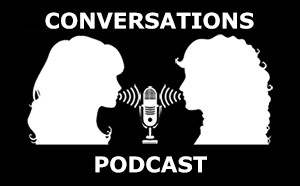S91: Enfoque en verbos reflexivos: la personalidad y el estado de ánimo con María del Mar
- Intermediate Level
It may take a few seconds for the episode to begin playing depending on your connection speed. If you see down below "Audio Not Available," that means that I am in process of uploading the audio to the podcast hosting, and it is in process to be released.
Verbos reflexivos: la personalidad y el estado de ánimo

In this episode, we are having a conversation using reflexive verbs so that you can have an opportunity to listen to how we use reflexive verbs in context.
We know from the research in Second Language Acquisition (SLA) that your grammar knowledge develops when you learn in context. We want to give you an opportunity to listen to us having a conversation with an emphasis on reflexive verbs.
Meet María del Mar

María offers online Spanish private lessons, so if you would like to know more about her, please visit her profile page by clicking on the link down below.
I try to have conversations with native speakers who offer lessons online so that you can have the ability to get in touch with those native speakers and ask questions about our conversation and use our conversation to learn more Spanish.
This link will take you to María's profile page on Verbling (a platform that enables you to take online private lessons).
Visita el canal de YouTube de Maria
Vocabulario de base
- divertirse, pasársela bien = to have fun
- motivarse, animarse = to get motivated
- alegrarse = to get happy
- enojarse, enfadarse = to get angry
- aburrirse = to get bored
- fastidiarse = to become annoyed
- cansarse = to get tired
- enfermarse = to get sick
- relajarse = to be relaxed
- apresurarse = to hurry up
- tranquilizarse, calmarse = to relax, to calm down
- sentirse bien = to feel good
- sentirse mal = to feel bad
- ponerse triste = to get sad
- ponerse contento = to get happy
- estresarse = to b stressed out
- desestresarse = to de-stress
- emocionarse = to be excited
- distraerse = to get distracted, to amuse or go do something for fun
- preocuparse = to worry
Actividad 1:
¿Qué idea no pertenece al grupo y por qué?
- a) divertirse b) motivarse c) alegrarse d) enojarse
- a) aburrirse b) fastidiarse c) cansarse d) enfermarse
- a) relajarse b) apresurarse c) tranquilizarse d) calmarse
- a) ponerse triste b) sentirse deprimido c) distraerse d) sentirse mal
- a) preocuparse b) estresarse c) enfermarse d) calmarse
Activida 2:
Verdadero o Falso
- Escuchar música a todo volumen es una buena manera de relajarse y desestresarse.
- Una persona paciente nunca se enoja, nunca se enfada.
- Meditar es una buena forma de relajarse, de calmarse, de tranquilizarse y sentirse bien.
- Generalmente, una persona se siente mal cuando las cosas no le salen bien.
- A la mayoría de la gente, no les gusta ponerse tristes, les gusta ponerse contentos.
Preguntas
- ¿Eres una persona activa, dinámica? ¿Te consideras, te visualizas como una persona activa?
- ¿Te motivas, te animas, te llenas de energía fácilmente para hacer tus quehaceres del día, para hacer tus tareas del día?
- ¿Qué haces para motivarte cuando te sientes cansada, cuando te sientes sin energía?
- ¿Eres madrugadora? ¿Te levantas temprano por la mañana?
- ¿A qué hora te levantas por lo regular?
- Cuando te levantas, ¿te sientes con energía, te sientes bien o te sientes cansada, te sientes con sueño?
- ¿Eres una persona paciente o te impacientas pronto, te pones impaciente?
- ¿Eres una persona que se preocupa mucho? ¿Te estresas por los problemas?
- ¿Eres apurada? ¿Haces las cosas rápido, te apresuras, te das prisa para terminar tus actividades pronto?
- ¿Tú te aburres cuando no tienes nada que hacer? ¿Te pones aburrida fácilmente?
- Cuando vas a una cita, cuando vas al doctor, el dentista o algún otro lugar y estás esperando, ¿te aburres, te pones aburrida?
- ¿Qué haces para desaburrirte cuando te aburres, cuando estás aburrida?
- ¿Te estresas mucho durante el día?
- ¿Qué haces para desestresarte cuando te estresas?
- ¿Te enojas cuando te aburres? ¿Te pones enojada?
- ¿Te enojas fácilmente o te contralas, te calmas, te tranquilizas cuando algo negativo te pasa?
- Cuando te sientes tensa o te sientes estresada ¿qué haces para relajarte? ¿Cómo te relajas?
- ¿Qué tipo de cosas te hacen sentir bien, te hacen el día, te hacen sentir contenta?
- ¿Qué tipo de cosas te emocionan?
- ¿Qué te emociona más: salir de viaje o ir a un concierto?
- ¿Qué tipo de cosas haces para distraerte?
- ¿Qué te gusta hacer para divertirte? ¿Hay cosas que te divierten mucho?
- ¿Qué te gustaría hacer más: subirte a una montaña rusa (a roller coaster), meterte al mar a nadar, lanzarte de un avión con un paracaídas, o quedarte en tu casa para ver una película?
Thank you for listening to the podcast!
If you find our podcast valuable, if you love the podcast, please recommend the podcast on Facebook, Twitter, Instagram or any other social media that you use. You can share your favorite episode and write one or two sentences about the podcast to share with your friends why you like the podcast. I am sure that you have at least one friend who also wants to learn Spanish and is perhaps looking for a good resource to help them learn Spanish. Please recommend the podcast. Thank you so much everyone!
-All the images are property of Shutterstock and Storyblocks, videos by Storyblocks and audio tracks by Storyblocks and YouTube Audio Library. My licensing grants me permission to show you the images and videos on my website or content but does not grant you permission to print, copy, download, redistribute, or reproduce any of them.
